How to Keep Hearing Aids Working in Cold Weather
The first time your hearing aids stop working in the middle of winter, it

By: admin | September 25, 2024
Have you ever thought about how loud noise can affect your hearing? This question rings true for many individuals, especially in their increasingly noisy modern world. Noise-induced hearing loss (NIHL) is a growing concern, relevant to anyone who finds themselves frequently in high decibel environments – from city dwellers dealing with busy streets, to music lovers attending concerts. It’s important to not only understand the risks but also learn how to protect your ears. So, what are causes and effects of noise-induced hearing loss and how can an audiologist provide practical tips for protecting your valuable sense of sound?
What is NIHL, and how can it affect your ears? Extended or sudden exposure to loud noise can harm the delicate structures within your ear, leading to noise-induced hearing loss. Here’s how it happens:
Grasping this process is crucial for taking steps to protect your ears and maintain your hearing health. How does sound pass through the ear when you are not experiencing hearing loss? This works by:
By understanding how the process works, this can help individuals to ensure they are taking the necessary steps to protect their hearing from further harm. After all, maintaining good hearing health is vital for communication and enjoying the many sounds of life. An audiologist will educate you on how to protect your ears, like making sure you are cleaning your ears regularly to prevent a build-up of earwax.
Recognizing the symptoms of noise-induced hearing loss is important, if you have been exposed to loud noises. You might be facing a challenge if you notice a decrease in your ability to hear or understand speech. This can feel isolating and frustrating, but there is a solution. Regular check-ups with an audiologist can help monitor your hearing levels and provide early intervention if necessary.
Another sign of noise-induced hearing loss is experiencing a ringing or buzzing sound in your ears after exposure to loud noises. This could indicate that your ears have been stressed by high decibel levels. Don’t ignore these signs – proactive measures such as using ear protection can prevent further damage and preserve your hearing health.
When experiencing noise-induced hearing loss, what are harmful levels of noise? Decibel levels measure the intensity of sounds. The higher the decibel level, the louder and potentially more harmful the noise can be to your hearing. Regular exposure to noise above 85 decibels can lead to hearing loss over time.
For instance, normal conversation usually falls around 60 decibels, while a rock concert can reach up to 120 decibels. Even short-term exposure at this level can cause damage to your hearing. It’s important for you to be aware of these levels and limit exposure whenever possible.
You might be surprised to learn that certain common sounds in our environment can pose a risk to your hearing health. For example, city traffic can reach 85 decibels, while power tools can generate noise levels up to 110 decibels. Being aware of these harmful noises can help you take preventative measures such as wearing ear protection or limiting exposure time. However, these noises are often unavoidable in daily life and may lead to gradual hearing loss over time if not properly managed.
When in noisy environments that can cause harm to your hearing always wear ear protection like earplugs or earmuffs. Try to limit your use of headphones or keep the volume at a moderate level. And if you’re having trouble with your hearing or have concerns about noise exposure, don’t hesitate to contact an audiologist for guidance and support. They will be able to assess the level of sound you can hear. Once the know the level of loss you are experiencing, your audiologist will provide a solution tailored to your unique needs.
What are the long-term effects of being exposed to high decibel sounds? Long-term exposure to high decibel levels can have lasting effects on hearing health. Prolonged exposure to loud noise can lead to noise-induced hearing loss over time. This condition occurs when the delicate hair cells in the inner ear are damaged by the intensity of sound, resulting in permanent hearing loss.
Additionally, exposure to loud noise can cause tinnitus, a ringing or buzzing sensation in the ears. Continued exposure to high decibel levels without proper protection can exacerbate these effects, increasing the risk of hearing damage and impacting overall quality of life. To mitigate these risks, it’s essential to limit exposure to loud noise, use hearing protection and prioritize regular hearing check-ups to monitor and preserve hearing health.
Regular visits to an audiologist can help catch any early signs of hearing loss, ensuring you get the necessary care and support promptly. In these routine check-ups, here’s what you can expect:
These steps are vital in maintaining optimal hearing health. Regular check-ups ensure that your devices are fit for your hearing needs, and to see if there need to be any changes made to your treatment plan, to offer a more precise listening experience. So, don’t wait until you notice a problem – schedule regular check-ups with an audiologist as part of your overall wellness routine.
When experiencing tinnitus or noise-induced hearing loss, you may not know how to protect your ears from all this noise. There are many treatment options, like hearing aids that can help to protect your ears from these noises. Consider investing in high-quality earplugs or earmuffs. These are especially useful if you work in a noisy environment or frequently attend loud events. They can significantly reduce the volume of sound reaching your ears, thereby reducing the risk of noise-induced hearing loss.
Second, make it a habit to take breaks from loud environments. If you’re exposed to high decibel levels for an extended period, try to step away for a few minutes every hour. This gives your ears some time to recover and reduces the overall impact of the noise on your hearing health. Protecting your ears doesn’t have to be complicated it’s about making small changes that add up over time. By following these practical measures, you can protect your hearing health.
Protecting your ears is not just about maintaining your hearing health, there could be an underlying factor like your diet that is affecting your hearing. A balanced diet rich in vitamins and minerals can help keep your auditory system functioning optimally. Regular exercise, on the other hand, improves blood flow to the ears, which can help prevent hearing loss. Here are some tips for a hearing-healthy lifestyle:
By making these simple changes to your lifestyle, you can not only improve your overall health but also help protect your hearing.
Another aspect of hearing health that often goes unnoticed is the impact of stress. High stress levels can cause tinnitus, a ringing or buzzing sound in the ears, and can also exacerbate hearing loss. Here are some stress management techniques that can help:
By managing stress effectively, you can reduce the impact of stress on your hearing. These techniques can aid in protecting your hearing and mental well-being.
When you choose the right protection for you and trying to maintain your health, there are numerous apps available that can measure the noise level in your environment and alert you when it’s potentially harmful. This can be particularly useful if you work in a noisy environment or attend loud events regularly.
In addition, modern hearing aids come with features designed to protect your ears from loud noises. Some devices can automatically adjust the volume based on the noise level in your environment, helping to prevent further damage to your hearing. If you already have some degree of hearing loss, it’s worth discussing these options with an audiologist.
It’s essential to spread awareness about noise-induced hearing loss. Educating your friends, family, and colleagues about the risks associated with loud noise can help protect them too. Encourage them to take precautions when exposed to high decibel levels and share what you know about the harmful level of noisy environments.
Prevention is always better than cure. By spreading awareness, you’re not just protecting your own hearing health but also contributing to a broader understanding of NIHL. Noise-induced hearing loss is a significant concern, but it’s one that can be managed with the right knowledge and tools. By understanding the causes, recognizing the symptoms and implementing preventative measures, you can effectively prevent further loss of hearing.
If you’re concerned about noise exposure or if you’ve noticed changes in your hearing, don’t hesitate to take action. Contact Macomb Audiology & Hearing Aid Center at our Macomb, IL location at (309) 731-4296 for more information or to schedule a consultation with one of our experienced audiologists. We’re here to support you in maintaining optimal hearing health. Our audiologists will help to find the right solutions for you, when protecting your ears.
Tags: hearing loss prevention tips, hearing protection products, noise-induced hearing loss

The first time your hearing aids stop working in the middle of winter, it
By: admin | January 19, 2026

Creating a hearing-friendly home starts with recognizing how much your
By: admin | November 18, 2025

Tinnitus is something many people experience at some point, where you hear
By: admin | August 21, 2025